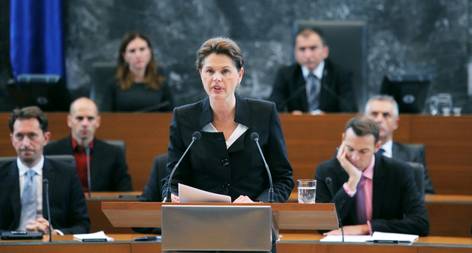NEWS
Prime Minister at presentation of amendments to the budget for years 2014 and 2015: "The budget does not call for the help of Troika; it is realistic, sustainable and development-oriented"
"The situation in which Slovenia is today and compliance with the commitments shown to the European partners that were made by the former Government on behalf of Slovenia confronted us with heavy dilemmas." These were the words with which the Prime Minister today at the 45th extraordinary session of the National Assembly presented to the deputies the situation underlying the amendments to the budget for years 2014 and 2015. In this context, she also pointed out three basic principles that were considered in the Government's endeavours, and are essential for the assessment of the budget. Firstly, the Government managed to reduce the budget deficit under 3%, thus fulfilling one of the basic requirements to prove EU credibility; Secondly, development will not stagnate on the account of debts, since a maximum possible funds under the current circumstances have been earmarked for education and investments into knowledge and research; Thirdly, investments will not slow down as they will be combined with European funds and will be considerably more focused. Moreover, the budged has been balanced without major cuts in pensions and social rights and without unilateral interventions in wages, but before all, as the Prime Minister stressed, "rather than calling Troika, the budget is realistic, sustainable and still endurable".
In continuation of her presentation of this basic document of the Government's functioning, the Prime Minister made the assessment of the situation or conditions in the country, which the Government had to consider in budget drafting. She stressed that the budget is consistent with the situation: "it is demanding, economical, in parts risky but nowhere dangerous". She explained that "the stability programme binds us to reducing the budget deficit, and that in addition to the rehabilitation of the banking system and sustainable public finances, this is the commitment that qualifies us for future discussion if we are to participate in this discussion as equal partners." She further called attention to the problem of negative economic growth; although it has been for the first time that after a year it did not exceeded 3 percent negative, but this is still not enough for optimism. Furthermore, "the draft budget put public finances in the framework of the fiscal rule and the amended referendum legislation, which makes any serious planning and implementation of the budget possible at all". The Prime Minister also mentioned the costs of bank rehabilitation, which still remains unclear, and therefore, the Government taking account of that too prepared the draft proposal of the budget with maximum care. As last but not the least important aspect in budget drafting, the Prime Minister pointed out the dissatisfaction of people, which is by all means justified: "And I understand it well enough, as the Government cannot count on people’s understanding of demanding moves until corruption and criminal activities have been consistently punished." Despite the difficult situation, the Prime Minister highlighted two encouraging facts, namely that this Government has managed to reduce the number of unemployed, and that exports this year have increased by 2.3%. "The first is not nearly enough and the second is attributable not only to our own endeavours but also to the first signs of economic recovery in Europe. But still, if we, in a state of general pessimism, overlook these two emphases, enthusiasm in two areas which are of key importance for future Slovenian development would be completely dampened for no good reason", said the Prime Minister.
The Prime Minister further touched upon certain dilemmas that were encountered in budget preparation. As the first one, she pointed out the dilemma regarding tax revenues, where the sole criterion was social justice, and which preconditioned the amendment in value added tax. The next issue was the relation between the public sector and investments; this contributed to the preservation and development of the fundamental achievements in a solidarity-bound society, education, health and social assistance. As the third dilemma, the Prime Minister mentioned the choice between investments in development and servicing of debts, where "the Government has managed to keep the majority of funds despite the crisis, and the individual cuts are measured by a single-digit percentage, for example in research from EUR 250 million to EUR 235 million".
The Prime Minister concluded that "the budget is a written plan of our common future, which means not the end of work but rather its beginning. Our common future will be European, sovereign and social Slovenia". Finally, the Prime Minister told to the attending deputies that in the given circumstances, and with the given team, they did everything in their power to find an appropriate balance between the just dissatisfaction of the people, the difficult crisis situation and consistent compliance with Brussels commitments to be able to prepare a realistic, sustainable and still bearable budget, being at the same time aware that this puts the Government, coalition strength and last but not least the credibility of the state to the test. The Prime Minister presented the budget document for consideration to the National Assembly as "a stronghold which should provide preservation of the full political and fiscal sovereignty of Slovenia".





